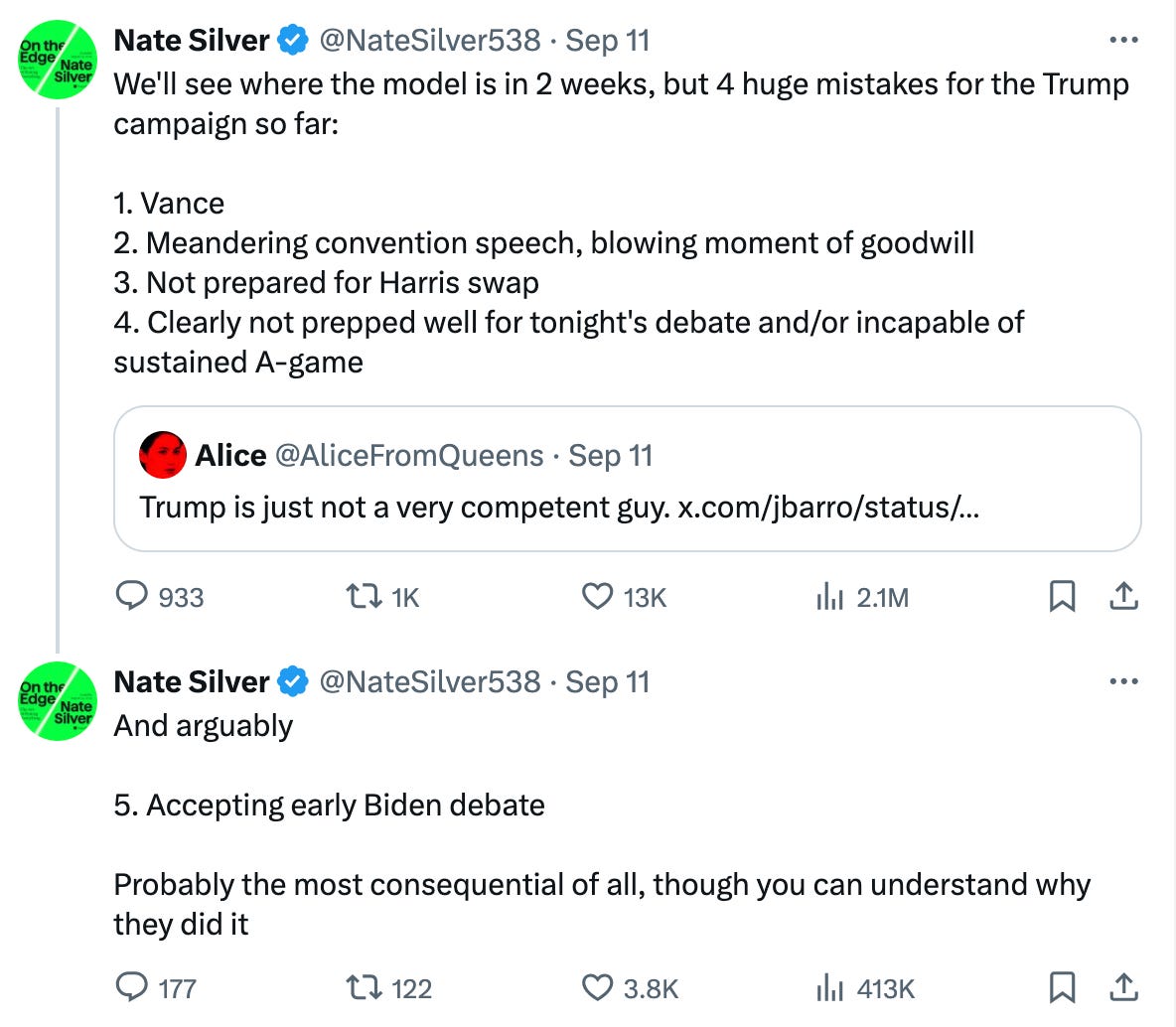This was Trump's election to lose. And he just might.
The Trump campaign has made a series of major mistakes.
One thing that hits a little different this year is that the main characters have really been the Democrats: Kamala Harris and, before her, Joe Biden.
Source for this? Me, someone who’s been writing on the Internet for a long time. My instinct has been that headlines involving “Harris” (or “Kamala”) or “Biden” will click better with Silver Bulletin readers than those involving “Trump”. We don’t A/B test our headlines, so that might be wrong. But it’s been validated if you look back at the top posts as determined by whatever algorithmic magic Substack uses, which are pretty Kamala- (and Biden-) centric. It was just a truism in 2016 and 2020 that if you wanted to drive traffic on the Internet, you framed the story around Donald Trump. But Google search interest in Trump is down by 2x or 3x relative to these past elections, while the numbers for the Democrats are up:
So I want to take this moment when we’re in something of a waiting period for reliable post-debate polls and consider the election from Trump’s perspective. Because as Matt Yglesias and Brian Beutler discussed in their podcast this week, this really ought to be Trump’s election to lose.
One worrying sign for Harris, for instance, is how quickly her momentum deflated after the Democratic convention, even though there wasn’t a whole heck of a lot going on in the news. Yes, in our forecast, that tendency was accentuated by the Silver Bulletin model’s convention bounce adjustment, which assumed the post-convention period would be strong for Harris. But even in our polling averages, which aren’t affected by the adjustment — and apparently even in the Harris campaign’s internal polls — her numbers were getting worse in most swing states after the convention.
That could be because the gravity of the election favors Trump: in newsless periods, he tends to become the favorite. This has significant implications for Harris’s strategy. Let’s say she emerges with a lead post-debate. If the steady state were a Kamala victory, she might want to sit on the sidelines and run out the clock. If, instead, the default outcome is that Trump tends to pull ahead when people aren’t actively thinking about politics, she might want to more proactively drive the news cycle, something her campaign seems more inclined to do after its disappointing and media-shy post-convention phase.
I realize there’s a type of liberal commentator out there who constantly makes the shruggie motion and asks why Harris isn’t winning by 20 points. Wasn’t January 6 awful? (Yes.) Isn’t Trump a little nuts? (Completely.) How can voters re-elect Trump after his first term, which culminated in a pandemic that killed more than a million Americans and wrecked the economy and the fabric of everyday life? (It must be the media’s fault!) I won’t try to provide a comprehensive answer to that question, though you can get a hint about my perspective on it here. Instead, I’d just say: look at the scoreboard. Trump has been involved in two past elections, and both came down to a few tens of thousands of votes in the Electoral College. We live in a democracy, and self-evidently, many Americans like him, whether they “ought to” or not.
In fact, the underlying circumstances of the race are probably more favorable for Trump than in 2016 or 2020. If he were running a perfect campaign, he’d be a clear favorite. (Fortunately for Harris, he isn’t. Instead, my guess is that we’ll be roughly back to 50/50 once the post-debate polls are fully accounted for.) There are five reasons for this, three of which are underlying circumstances that would apply to any Republican running against any incumbent Democratic regime and two of which are particular to the circumstance of this election.
The Electoral College
Since 2000, the average margin of victory for the party that won the popular vote has been 3.4 percentage points. So, it’s just an enormous problem for Democrats that the Electoral College favors Trump by roughly 2.5 points, according to our model's estimate. It’s like spotting the opponent a field goal in an NFL game that will likely come down to the wire.
Now, maybe I should be giving Trump more credit. Both campaigns know that American elections are determined by the Electoral College, and they formulate their strategies accordingly. Trump’s populist coalition overperforms on a map that gives rural, white voters more influence. If some voters are de facto worth more than others, the game-theory equilibrium dictates that you should account for that. Still, Harris and other Democrats are running uphill, given the present configuration of the map.
The economy
There’s a certain type of Democrat — often, the same type who insists that Harris should be winning by 20 points — who frequently complains that the economy is completely amazing and Biden-Harris should be getting more credit for it. But that’s just bullshit. Economic indicators are mixed. The labor market has been extremely strong (despite some recent downward revisions). But if you look at the Silver Bulletin economic index, you can quickly see why voters might have some reason to be upset based on the objective data:
The trajectory of the first category in that chart — real disposable personal income, basically how much money you have left over after taxes, historically one of the best predictors of election outcomes — has been flat during Biden’s tenure: people’s incomes aren’t growing. Part of that was due to spikes caused by COVID stimulus spending — but even over the past year, it’s barely kept up with population growth:
So you can understand why this makes for fertile ground for economic populism. Perhaps in part because of factors like algorithmically-driven price discrimination, there’s more producer surplus than ever, while consumers are squeezed. This might still work out great if you have significant investments in the stock market, but not if you’re relying on a passive income. And that’s saying nothing about inflation, which has abated recently — but nevertheless, prices are about 20 percent higher than when Biden assumed office, and inflation has been especially visible in consumer-facing sectors of the economy. If I’d told you four years ago that inflation would run as high as 9.1 percent at some point during Biden’s tenure, even if it fell significantly after that, you wouldn’t be surprised that the Democratic ticket was struggling to get re-elected.
The anti-incumbent mood
Indeed, incumbent parties all around the world have been struggling, from the Tories getting slaughtered in this summer’s UK election (rude of them to hold it on July 4!) to Modi’s party losing a bunch of seats in India. Without getting into some grand theory of political economy, most global leaders are unpopular, and the incumbency advantage has been steadily declining in American elections. And so accordingly, Harris has been trying to frame Trump as the incumbent even though her party has run the White House for the past three-and-a-half years.
The fact that Joe Biden stubbornly tried to be president until he’s 86
During Harris’s honeymoon period after Biden dropped out, you frequently heard the claim that Democrats were lucky for how things had worked out. Harris didn’t have to face the rigors of a competitive primary and the intraparty division and scrutiny that would bring.
But now that gravity has brought the race back to 50/50, I think you can see why that claim is dubious. While Harris is clearly a better option than Biden, she may or may not be the strongest Democratic candidate. There were basically two knocks on Harris: first, that she just wasn’t a natural politician, given a middling-at-best electoral track record. And second, that she’d veered far to the left of the median voter, especially in her 2019 campaign. While she’s overcome doubts about the former concern, the latter could still be an issue.
And yes, if Biden had exited the race a year ago and Democrats had an actual primary, my guess is that Harris would have won it, probably handily. Still, the conventional wisdom is unnecessarily phobic of holding primaries. The advantage is that they provide for some option value: you get to see who’s product actually sells under the rigors of a campaign, which doesn’t always match who looks good on a whiteboard. And the nominee gets some reps in for the general election campaign.
Instead, Harris has been forced to learn how to fly the plane while she’s already in the pilot’s seat. She inherited a lot of Biden’s staff — her campaign is still headquartered in Delaware. Personally, given the terrible campaign they ran, I’d have given all senior Biden staffers an all-expense-paid trip to Easter Island with a return ticket for Nov. 6. But you can understand why Harris stuck with them: she was trying to unite her party and ensure some continuity while learning on the fly. Still, this creates burdens: she doesn’t have much of a policy team, for instance.
And Biden remains quite unpopular, although he’s seen improvement in his numbers after exiting the race. Harris has been lucky that the media has been largely uninterested in Biden and his fitness for office since he quit, but an international or domestic crisis that tests Biden’s uptime is still a downside risk for her campaign.
The attempt on Trump’s life
I’ll admit: for a few days after Trump was shot at during a rally in Butler, Pa. on July 14, producing the iconic photo of his defiantly raised fist, I assumed the race was pretty much over. He seemed like a sympathetic figure for once, and indeed, Trump’s favorability ratings improved after the incident to the highest they’ve been in years. (Or if you don’t trust the polls, take it from “Blue MAGA” conspiracy theorists who recognized the political boost it might provide to Trump and insisted the whole thing was staged.)
But Biden’s exit from the race knocked the assassination attempt off the front pages. And the media has been reluctant to revisit it: there were no questions about it at this week’s debate, for instance.
However, Trump also squandered the opportunity with a meandering convention speech a few days later that started out discussing Butler but soon veered off in a million different directions. And indeed, this is one of a number of major mistakes he and his campaign have made, from their selection of JD Vance to their lack of prep work for this week’s debate.
Trump is still in reasonably good shape for all the reasons I mentioned above, and I don’t think the Harris campaign is entirely bluffing when it calls itself the underdog. But if the coin comes up tails and Trump loses, he’ll have let the election slip out of his grasp.







This was Trump's election to lose if he remained the non-insane, semi-coherent version of himself that existed in the figment of imaginations of half the electorate. Unfortunately for him, that was never going to survive contact with reality for anyone but the cultists.
Trump’s biggest mistake was the early debate. Might have been the worst political decision made in a presidential campaign. Had Biden still been in on September 10th we would have had a horrible debate and no time to swap out.
Trump then decided to keep doing what he was always doing after Butler. He could have toned down the dog whistles and called for unity. Nope, he decided to double down on this America is a hellhole rhetoric.
He still might win but right now he was very much up 28-3 and now the game is tied.